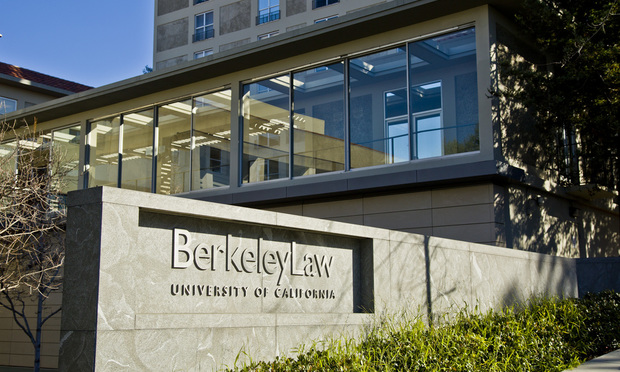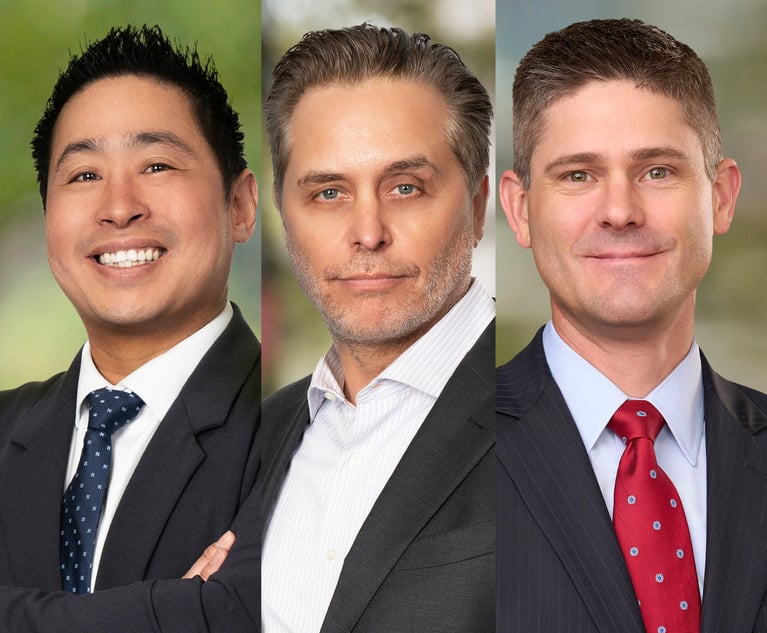Berkeley Law Is Deeply Divided on 'Boalt' Name, Chemerinsky Says
The University of California, Berkeley School of Law dean discusses the movement to remove references to John Boalt from the law school, and why people on both sides feel so strongly about the issue.
September 14, 2018 at 01:43 PM
6 minute read
 University of California at Berkeley, School of Law. Photo: Jason Doiy
University of California at Berkeley, School of Law. Photo: Jason Doiy
The University of California, Berkeley School of Law has been known colloquially as Boalt Hall for decades, but that name could soon disappear from the Bay Area campus after information surfaced about the racist past of John Boalt—a 19th century California lawyer who pushed for the Chinese Exclusion Act.
A law school committee this week recommended the removal of the Boalt Hall name from one of the school's four buildings and that other references to Boalt in student organizations and elsewhere be excised. (The committee did not recommend stripping the Boalt name from two endowed professorships, which would require the involvement of the California attorney general.)
Berkeley is not the first law school to confront the legacy of a racist namesake. In July, a panel at Florida State University recommended stripping the name of former Florida Supreme Court Justice B.K. Roberts from the Tallahassee school. Roberts resisted racial integration efforts from the bench throughout the 1950s. And Harvard Law School in 2016 decided to do away with its official seal because it featured elements of the family coat of arms of early donor and slaveholder Isaac Royall Jr.
John Boalt in 1887 delivered a speech at the Berkeley Club called “The Chinese Question,” in which he argued that Chinese immigrants who immigrated to the state during the Gold Rush would never assimilate. The speech was circulated widely in the run-up to the 1882 Chinese Exclusion Act, which barred Chinese laborers from coming to the United States.
Boalt himself had no direct connections to the law school, but his widow, Elizabeth Josselyn Boalt, donated money to construct a law school building in 1906 in his name. The law school moved to a new building in 1950, a portion of which still bears the Boalt name. While many people referred to the school as Boalt Hall, the committee concluded that was never the school's official name. Rather, Boalt Hall refers to a specific building, according to the report.
The proposed renaming has touched a nerve with many on the law school community, some of whom refer to themselves as “Boalties.” We spoke with Dean Erwin Chemerinsky this week to find out what happens next and what he's hearing from students and alumni. His answers have been edited for length.
What happens now? Do you have a position on the renaming?
 Erwin Chemerinsky.
Erwin Chemerinsky.What I'm doing now is receiving comments from people on the committee report, and then I'll make a decision in November. The report came out Monday afternoon about 4 p.m. When I last checked my email this morning [Thursday] I had received more than 400 messages from alumni, faculty, staff and students, and I'm answering every single one of them individually. I'm going to wait to see what everybody has to say then think carefully about it and announce a decision. The committee has issued its report, and we're now at the stage where I'm receiving comments so that I can decide what is the best thing to do.
Is there any consensus among the comments you've received thus far?
I've not counted, but they are quite divided, and not in the way I would have predicted. I would have thought the alums from the earlier classes would be more tied to the Boalt name, and that current students wouldn't be attached to it. But I have plenty of alums from the 1960s and 1970s who are saying, “Change the name.” And I have plenty of current students saying, “Keep the name,” and vice versa. There's not the pattern I expected to see.
I'm also surprised that some younger students want to keep the Boalt name. What are their arguments?
Their arguments are like those who graduated earlier: Tradition, and the importance of it; a perception that Boalt is known as part of the brand of Berkeley Law; and also the ideological position as to when it's appropriate to change names. Those who oppose it say that we shouldn't be judging past actions by current values. On the other hand, those who support the change say [the school] has never officially been called Boalt—it has always been Berkeley Law School—and they believe we shouldn't name things after people who said vile, racist things.
Did you initially realize how controversial this issue would be?
The stories about John Boalt being a racist came out before I took over as dean. As soon as I arrived, there was substantial pressure from a number of students and alums to remove the use of the Boalt Hall name. In October, I created the committee.
I had heard enough from people at that point to expect that it would be controversial. What was most important for me was to create a process that was thorough, where everyone would have a chance to feel they were heard. The committee solicited written comments and held a public forum. It was very careful in its analysis. I decided I'd release the report to the law school community, then take about six weeks to hear what people say. There are intense emotions on both sides.
What was the atmosphere like at the forum on the name change?
The atmosphere was wonderful and remarkably civil. Careful arguments were presented on all sides. Everybody treated everyone else with great civility. It was really the ideal of what a law school and university should be, with a sense of reasoned disagreement. People feel strongly but they engage in civil discourse.
What was your initial reaction to reading John Boalt's “The Chinese Question”?
John Boalt said very vile and racist things. I think the question is: What to do with that today, in light of the history of how the Boalt name came to be use in the law school?
Colleges and universities are facing this all over the country. It's inherently a divisive issue. For me, one of the hard things as dean is that whatever I decide, I'm going to please about half the people, and upset about half the people. They all feel strongly. Of those who care, it seems pretty closely divided. I wish I could find a path that would make everybody happy.
This content has been archived. It is available through our partners, LexisNexis® and Bloomberg Law.
To view this content, please continue to their sites.
Not a Lexis Subscriber?
Subscribe Now
Not a Bloomberg Law Subscriber?
Subscribe Now
NOT FOR REPRINT
© 2025 ALM Global, LLC, All Rights Reserved. Request academic re-use from www.copyright.com. All other uses, submit a request to [email protected]. For more information visit Asset & Logo Licensing.
You Might Like
View All
White & Case KOs Claims Against Voltage LLC in Solar Companies' Trade Dispute

Goodwin Procter Relocates to Renewable-Powered Office in San Francisco’s Financial District

Polsinelli Picks Up Corporate Health Care Partner From Greenberg Traurig in LA

Perkins Coie Lures Former Longtime Wilson Sonsini Tech Transactions Partner
Trending Stories
- 1‘Catholic Charities v. Wisconsin Labor and Industry Review Commission’: Another Consequence of 'Hobby Lobby'?
- 2With DEI Rollbacks, Employment Lawyers See Potential For Targeting Corporate Commitment to Equality
- 3In-House Legal Network The L Suite Acquires Legal E-Learning Platform Luminate+
- 4In Police Shooting Case, Kavanaugh Bleeds Blue and Jackson ‘Very Very Confused’
- 5Trump RTO Mandates Won’t Disrupt Big Law Policies—But Client Expectations Might
Who Got The Work
J. Brugh Lower of Gibbons has entered an appearance for industrial equipment supplier Devco Corporation in a pending trademark infringement lawsuit. The suit, accusing the defendant of selling knock-off Graco products, was filed Dec. 18 in New Jersey District Court by Rivkin Radler on behalf of Graco Inc. and Graco Minnesota. The case, assigned to U.S. District Judge Zahid N. Quraishi, is 3:24-cv-11294, Graco Inc. et al v. Devco Corporation.
Who Got The Work
Rebecca Maller-Stein and Kent A. Yalowitz of Arnold & Porter Kaye Scholer have entered their appearances for Hanaco Venture Capital and its executives, Lior Prosor and David Frankel, in a pending securities lawsuit. The action, filed on Dec. 24 in New York Southern District Court by Zell, Aron & Co. on behalf of Goldeneye Advisors, accuses the defendants of negligently and fraudulently managing the plaintiff's $1 million investment. The case, assigned to U.S. District Judge Vernon S. Broderick, is 1:24-cv-09918, Goldeneye Advisors, LLC v. Hanaco Venture Capital, Ltd. et al.
Who Got The Work
Attorneys from A&O Shearman has stepped in as defense counsel for Toronto-Dominion Bank and other defendants in a pending securities class action. The suit, filed Dec. 11 in New York Southern District Court by Bleichmar Fonti & Auld, accuses the defendants of concealing the bank's 'pervasive' deficiencies in regards to its compliance with the Bank Secrecy Act and the quality of its anti-money laundering controls. The case, assigned to U.S. District Judge Arun Subramanian, is 1:24-cv-09445, Gonzalez v. The Toronto-Dominion Bank et al.
Who Got The Work
Crown Castle International, a Pennsylvania company providing shared communications infrastructure, has turned to Luke D. Wolf of Gordon Rees Scully Mansukhani to fend off a pending breach-of-contract lawsuit. The court action, filed Nov. 25 in Michigan Eastern District Court by Hooper Hathaway PC on behalf of The Town Residences LLC, accuses Crown Castle of failing to transfer approximately $30,000 in utility payments from T-Mobile in breach of a roof-top lease and assignment agreement. The case, assigned to U.S. District Judge Susan K. Declercq, is 2:24-cv-13131, The Town Residences LLC v. T-Mobile US, Inc. et al.
Who Got The Work
Wilfred P. Coronato and Daniel M. Schwartz of McCarter & English have stepped in as defense counsel to Electrolux Home Products Inc. in a pending product liability lawsuit. The court action, filed Nov. 26 in New York Eastern District Court by Poulos Lopiccolo PC and Nagel Rice LLP on behalf of David Stern, alleges that the defendant's refrigerators’ drawers and shelving repeatedly break and fall apart within months after purchase. The case, assigned to U.S. District Judge Joan M. Azrack, is 2:24-cv-08204, Stern v. Electrolux Home Products, Inc.
Featured Firms
Law Offices of Gary Martin Hays & Associates, P.C.
(470) 294-1674
Law Offices of Mark E. Salomone
(857) 444-6468
Smith & Hassler
(713) 739-1250






